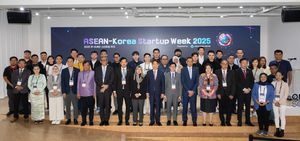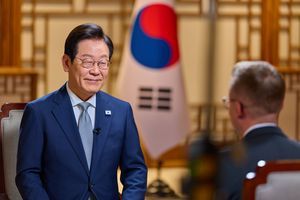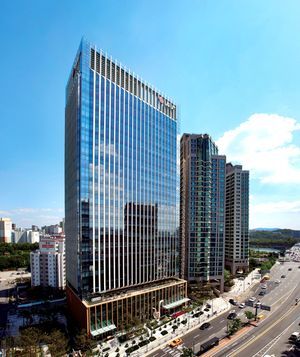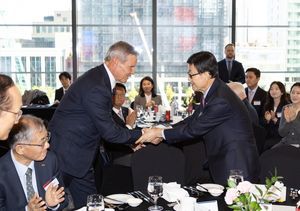![Ahn Se-ryeong (center), economic minister at the South Korean Embassy in Washington; Wendy Cutler (right), vice president of the Asia Society Policy Institute; and Tami Overby, senior adviser at Albright Stonebridge Group, attend a forum at the Korea Economic Institute of America in the US capital on Monday. (Yonhap)]](https://contents-cdn.viewus.co.kr/image/2025/07/CP-2023-0309/30648653.jpg) A South Korean diplomat on Monday reiterated Seoul’s commitment to accelerating trade talks with US President Donald Trump’s administration over the next two weeks, hoping for a deal that expands two-way trade rather than constraining it.
A South Korean diplomat on Monday reiterated Seoul’s commitment to accelerating trade talks with US President Donald Trump’s administration over the next two weeks, hoping for a deal that expands two-way trade rather than constraining it.
“We aim to intensify substantive discussions over the next two weeks – with the deadline extended to August 1 – to find common ground between Korea and the United States. Our goal is to achieve a mutually beneficial agreement that enhances and broadens our bilateral trade, rather than limiting it,” she stated during a forum hosted by the Korea Economic Institute of America.
The minister acknowledged that while Seoul fully comprehends Trump’s resolve to rebalance the bilateral trade relationship, Korea believes that tackling non-tariff barriers and promoting cooperation in the manufacturing sector must be pursued simultaneously.
“This strategy will be crucial in reducing the trade deficit, not just in the short term, but also in a more systematic and sustainable way over time,” she explained.
Referring to a recent Washington visit by South Korea’s Trade Minister Yeo Han-koo, Ahn revealed that he presented a vision for a “manufacturing renaissance partnership” to US officials as part of Seoul’s efforts to reach an agreement.
“The US has expressed keen interest in Korea-US collaboration in strategic industries, such as shipbuilding and semiconductors,” she noted, dubbing this approach to bilateral cooperation as “ships and chips.”
Furthermore, the minister underscored Seoul’s desire to secure exemptions or relief from sector-specific tariffs implemented by the Trump administration under Section 232 of the Trade Expansion Act of 1962. This law empowers the president to adjust imports when they are deemed a threat to national security.
“We consider Section 232 sectoral tariffs as crucial as reciprocal tariffs for Korea, given that over half of our exports to the US could be impacted by current and potential future sectoral tariffs,” she stated.
The Trump administration has already imposed sectoral tariffs on steel, aluminum, automobiles, and certain parts, while contemplating new tariffs on pharmaceuticals and semiconductors.
Reciprocal tariffs, including 25 percent duties on South Korean goods, are scheduled to take effect on August 1 unless both parties reach an agreement beforehand. These tariffs were originally set to be implemented last Wednesday following a 90-day pause, but President Trump extended the deadline to August 1, allowing additional time for negotiations.










Most Commented